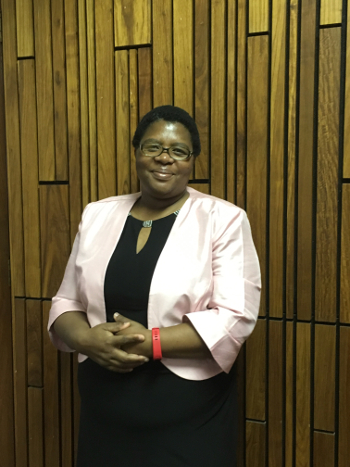News & Events
Teaching and learning excellence

“When I started studying postgraduate at Unisa, I found that it was difficult to be a student at an ODeL institution. In fact, it was such a task that I started to think more and more how it would be for students coming from disadvantaged schools and being thrown into the deep end, as it were,” said Ms Sibisi. Then I joined Unisa as a junior lecturer and spent some time trying to understand challenges facing students. I realised the main challenge was the lack of full support in an ODeL environment. In order for these students to achieve a fraction of the potential that they displayed, more help would be required from us, their lecturers and leaders.”
Ms Sibisi had been working with specific modules at the time of her award and had expended effort beyond the call of duty to design strategies and help students learn by being quicker to respond to their needs and responding to all their queries timeously. “I spend a lot of time investigating because I do not like to generalise as this can create confusion. When supporting students I always keep in mind that I am a Unisa ambassador, hence I should always protect our image.”
“In the 1501 module - a first-year course so the students were fresh out of grade 12 - I ensured that I was always available to them, whether it was on WhatsApp, email, telephone, cellphone or via their discussions on myUnisa. One has to remember that they are still finding their feet in this environment in ODL. An online module is even more challenging since some students have never used a computer throughout their basic education. Because of my involvement I found that students did remarkably well, and they kept in contact with me to express their gratitude.”
“It’s important to note that I do not spoon-feed these students, but I do assist them in understanding how they can find the information that they are looking for. Oftentimes the trouble that they encounter is a lack of computer skills when using the internet to work on myUnisa and do their research. I use WhatsApp so that it’s a step-by-step conversation with these students, to ensure that I am there to answer those broad questions and guide them to the knowledge they need.” As Ms Sibisi points out, too often underachieving students are dismissed as being lazy, and it is a small step to considering their backgrounds and circumstances, to better understand why it is that they struggle to meet the expectations set upon them. “I always tell them, I can teach them to fish, but I will never feed them. I provide full support so that they can learn independently and gain self-confidence.”
“Once the student is at a university, the school chapter has been closed,” Ms Sibisi noted. “The schools are in no position to teach anything to our students. However, it is our duty to bridge that gap, because who else will? A university is not a university without students. And that is why, the needs of the students should always be foremost in our minds. Training of teachers is the most important reason for the existence of universities because without teachers we would not have universities. I am what I am because of the teachers.”
* By Carmen Taxer
Publish date: 2018/04/19
